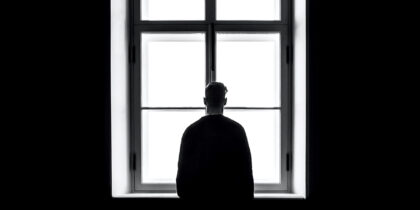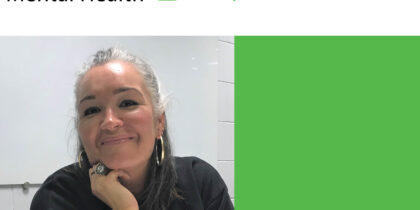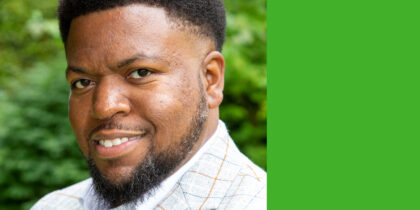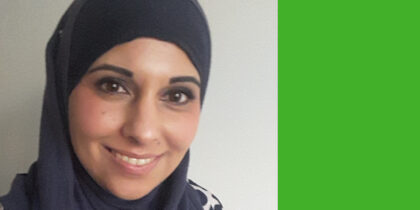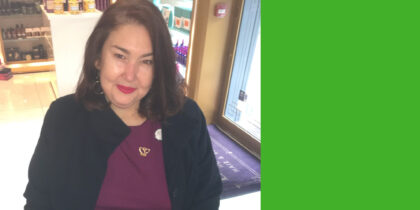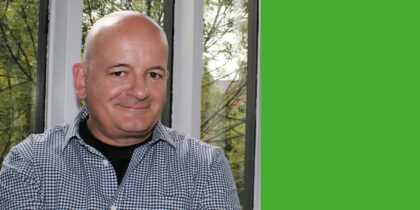Dr Amy Pollard joins Thea Joshi to talk about her new role as the Centre’s writer in residence, explaining how she has drawn on painful lived experience of bipolar to distil ideas which can be shared with others. Amy’s first piece focuses on loneliness in mental health, putting it in the context of the Enlightenment, and they discuss how the Enlightenment has shaped our thinking about concepts such as rationality and ‘madness’.
Listen to the episode on Spotify or iTunes. The full transcript is available below.
Show notes:
- Read Amy’s first piece, Banished: The roots of loneliness and mental health
- Check out the Mental Health Collective and #KindnessByPost
- See all our writer in residence pieces
Music by scottholmesmusic.com
Transcript
Alethea Joshi (AJ): Hello, and welcome to Centre for Mental Health’s podcast, where we explore ideas around mental health, equality, and social justice. I’m your host, Thea Joshi, and in each episode we talk to people with lived experience, those working in a specific area of mental health, or some of our own team, to share what we’re doing in the fight for equality in mental health. Earlier this month I caught up with Dr Amy Pollard, who is our new Writer in Residence. As I say in the podcast, her writing (and her speaking) sometimes blows my mind; we had a fascinating conversation. We discussed her lived experience of Bipolar disorder and the way she has drawn on sometimes very painful experiences to distil ideas which can be held and shared with others. We also discussed her first piece as our Writer in Residence where she discusses loneliness in mental health and puts it in the context of the Enlightenment, as well as exploring how the enlightenment has shaped our thinking about concepts such as rationality and madness.
AJ: I’m really happy to say we’re here with Dr. Amy Pollard, who is the founder and director of the mental health collective. And she’s also our newest writer in residence. So hi, Amy. It’s lovely to be here with you.
Amy Pollard (AP): Hello, I’m very happy to be here.
AJ: So firstly, I just want to just a little bit more about the Mental Health Collective, where did the idea come from? Yeah, can you tell us a bit more? Amy Pollard So we incorporated in September 2018. So we’re just coming up to our third anniversary, which is quite exciting. And I suppose it came out of out of me basically kind of feeling a bit stuck and feeling like I needed, I really, I felt very called to try and make my fullest contribution that I could in the mental health space. But it was a bit like, I couldn’t really find the right vehicle to take me forward in it. So I kind of basically built my own life raft in order to sail on my journey, basically. And then having done that, I discovered that there were lots of other people who were, you know, wanting to go in their own journeys in different directions. So it’s been an incredible adventure. And it’s taken me by surprise, so much, but to sort of tell you about me, so I’m a comprehensive school girl who studied social anthropology for years and years and years into my PhD. So I guess my education all through is really about culture in diverse communities of different kinds. And I started my career, I worked for 10 years in international development and focused very much on power and voice and accountability, like working particularly in charities and government, academia and kind of swirling around that world. And it went pretty well, you know, I was quite successful, did some did some cool stuff, we did a big global campaign that culminated in the Sustainable Development Goals.
But during that period, I kept getting really, really unwell. So I have a bipolar diagnosis. And so I had these kind of spectacular falls right in amongst those periods that were good. And, you know, the first time it happened, I sort of dusted myself down and got back on the horse, and I sort of took pride in trying not to let it derail me. And then the second time it happened, I sort of looked at my work life balance, and started sort of being much more serious about self care and thinking, okay, you know, this doesn’t have to ruin your life and your career, you probably just needs to take better care of yourself. But then that happened for a third time. And I was like, hmm, it’s probably time for a strategic review. So then I kind of thought, well, you know, instead of basically seeing like, life and me, being sort of existing in one sphere, and then work existing in another sphere, and then basically like, my health problems, sort of pulling against what I’m able to contribute professionally, like, if I pivot into the mental health sector, so that, when I’m learning and contributing professionally, that will improve how I’m able to look after myself, personally.
So I took that step and to be honest, at the time, I thought that was going to mean jettisoning, like all of the expertise and all of the stuff basically, that I’d learned in my professional career today, and I thought I would end up retraining as a psychiatrist, or a psychologist or a social worker, or, you know, one of those things that I would see as the professions in the mental health space. Which, frankly, was like a bit sad, but also, you know, I kind of thought that’s just how it was. And to get the lay of the land, I got a more junior job, working in policy for a little bit just to get my bearings. But then during that time, basically came to thinking that just looking around it at the mental health world, it seemed to me that actually that expertise I built up around power and voice and accountability, are actually quite useful in the mental health world, like the mental health space isn’t falling over itself with social anthropologists, and it doesn’t actually, like the social science base, with some notable exceptions is quite impoverished, I would say compared to other arenas. And it seemed to me that there was a lot to bring and that, you know, not just myself but probably other people could bring a lot of new ideas and new kind of vigour, perhaps and freshness to that world. Maybe by bringing not only professional expertise, but a kind of lived experience to bear. And it seems to me that people talk about like the bio psycho social model that really, like those three points in the triangle are not equally weighted, and it’s appreciating the context, I think. And, you know, the cultural context is something that I think is very frequently overlooked for everyone you know, especially for marginalised racialised communities, but for mainstream society, too. I don’t think we pay very much attention often to the social context and the cultural context in which unwellness emerges. It’s often quite obvious, frankly, when you, when you when you come to look at it.
One of the things I think has been a cause of huge celebration over recent years [is] where people have been taking more of an interest in the structural causes of poverty, structural causes of mental health, that’s all really good. But I think sometimes the metaphor of a structure that is implied in that framing, can sometimes put us on the wrong, like, get us imagining things in the wrong way, Because if you think of a structure as something solid, right, like something that’s immovable, like a structure is the bones of the house, for example, or, you know, there’s a solidity to it. And I think that you’ve got to choose your metaphors. But I think that it’s important not to be too fixed on structure as your metaphor because sometimes, if you were to experiment thinking about it as as fluid more or as air, earth, there’s other sorts of ideas that you can you can use to appreciate the context in which we’re living, you can dislodge and look and dislodge some of the assumptions that make difficult problems seem intractable.
AJ: Yeah. Wow, that’s amazing. I was saying to Amy, before that her writing – and her speaking – just blows my mind. Because you just have this really fresh, interesting way of thinking about society, and specifically about mental health. And we will get into that, talking about your first piece. But I guess I just wanted to ask you a little bit more about, what has the Mental Health Collective been doing? Because I know you’ve done multiple different activities and projects. And I’d love to hear a bit more about that.
AP: So yeah, since 2018, we’ve experimented really, we’ve had a bunch of different projects. And we started out doing a thing called self defence through humour, working with young people to design a training programme, all about how we can use humour to defend ourselves against threats to our mental health. It was really cool. It was really good fun. And, yeah, we co produced it alongside like a bunch of young people, 13 and 14 year olds, who worked with us when they were studying towards their Duke of Edinburgh awards. And then ran it as a programme in a few different schools, and also at King’s College London. And then we used that project as a springboard to do a piece called Phone Zombies, which was a project all about, like, what’s really going on with mobile phones and mental health? And like, from the perspective of young people themselves. So we did an amazing, jointly created research piece with the young people, trying to figure out, are we all turning into zombies on our phones? Or is this just a moral panic, like, you know, historically, there’s been, every time a disruptive technology comes along, that changes community, changes communication patterns, and of course, changes relationships, and blah blah blah, you know. So like, in the 50s, people thought that rock and roll was poisoning all the teenagers’ minds and is this just like that again? But anyway, that was really fascinating. And it culminated in this April Fool’s joke, where we got people from all around the country pretending that they were turning into zombies on their phones, and like, marching on London to come and eat the Queen. It was really cute and silly.
But the thing that’s really exploded and became our big thing is a project called Kindness by Post, which is a random acts of kindness exchange. Basically, people members of the public, anyone who lives in the UK can sign up to send a card or a letter with a message of goodwill to someone they don’t know. And then they get allocated someone to send a card or letter to them. It’s like a giant Secret Santa. You don’t know who’s sending to you. It’ll be a different person than the one you’re sending to. And then everyone posts the cards that they send and receive on social media and you get this extraordinary blizzard of gorgeous loveliness. It’s just so gorgeous. Like I thought I would get bored of it, I thought everyone would get bored of it. But yeah, like, it’s so strange how, you know, I’ll always post this thing myself and like I’ll send off my card and weirdly find it kind of poignant to sit there and take a space to think what can I say to this stranger that might sort of lift them on this day. And I always think I’m doing it to give to somebody else. But then when something falls through my own door, it just pricks my eyes every time and like, you know, it doesn’t always happen. But so frequently, I’ll open that envelope, and they’ll say something that really resonates or like catches me off guard and makes me realise, oh, no, you know, I thought I was fine. But actually, there is a vulnerability in me that needs to be spoken to today. And that’s the thing I’m most proud of it and it is a project that makes a movement from the way that each of us have a lot of strength and something to offer and something powerful in that everyday kindness, but that each of us also have that vulnerability. And you’re never so sorted, that you can’t benefit from a bit of kindness from someone.
AJ: That’s incredible. And I just love that idea. And I also love the fact that it goes on social media, because, you know, as you’re aware, as we’re all aware, sometimes it’s such a place of vitriol and not nice things. But it’s just so lovely to think that these things are being posted, like lots of loveliness. And so we will obviously link in the show notes to the Collective and for people to get involved in that.
AP: Yeah, our next exchange is in the autumn.
AJ: You told us earlier a little bit about your experience of bipolar and I just wondered if you wanted to share a little bit more about that, and how it’s kind of led you to this point, and led you to the writing that you’re doing for us at the Centre.
AP: Yeah, obviously there’s as many different types of bipolar as there are people with bipolar. My journey with it has basically been towards surfing and swimming in that energy, rather than drowning. So I guess what happens to me is that I’ll have periods where I sort of toddle along, more or less as normal, and then there’ll be times when I’m just sort of struck or, it can feel like being in the hold of a kind of energy and a set of ideas and observations and creative stuff that kind of feels like it really needs to come out. And it’s sort of like a kind of diamond that won’t leave you alone, you know, that kind of really needs to be got out there. And so, I’ve kind of been building a relationship with that side of myself for a long time.
And coming from an anthropological background, my strategy has really been to take notes. So I’ve been taking notes on these what I say, psychological field trips, since 2006, when I go into a slightly sort of altered altered state of consciousness. And I think it’s, to be perfectly honest, I don’t really think it’s that special, I think it’s kind of like the type of consciousness that you might get, like, in between being asleep and being awake, like that kind of hypnogogic modality. And women get it, often when they’re just about to give birth, a slightly kind of coexistence of subconscious unconscious forces that sort of swell. And the trick is to learn to let it go and to learn to like surf with that energy, basically. Which is easier said than done. But can be done, definitely can be done. Like basically, after each of my kind of psychological field trips, I always try and write up the notes, I take literal notes, but sometimes that’s not possible. I try and crystallise what that experienced was like in various ways, whether that’s through artwork or a story, like writing, or some other kind of expression. And it’s a bit like, you know, how, like the waves going in and out, will kind of smash pebbles on a beach, and kind of gradually turn a very sharp rock into something that that is smooth and can be sort of constantly held. And what I’m attempting to do is take some very, what have been very sharp and painful, stones, which have felt like they were being hurled at me, quite frankly. And gradually over the years, take the sharp edges off and get them to a point where they can be held and even passed to somebody else.
Like I said, I mean, I don’t think it’s that special in a way because I can see the continuity between like the experiences I’ve had and then you know what everyone deals with on a daily basis. But equally, it’s a bit like giving birth in so far as, like it’s very difficult and it can be quite painful and feel quite frightening. And it’s special, you know, but on another level, like there’s one born every minute, right? And like, it’s actualities, like on one level, it’s very banal and very ordinary. On another level, it’s like, the most important and special thing you could probably do.
AJ: I just love that. Firstly, thank you for sharing that with us because obviously it’s personal. But I love and I’m fascinated by the way you conceptualise it, the way you talked about taking notes. I wonder, does that help you sort of externalise it a little bit and kind of put a little bit of distance between you and what’s going on, almost?
AP: Yeah. So again, I think there’s two key functions to it. One is that it’s a promise to myself that this too shall pass, you know, because if you write a note to yourself, then you’re intrinsically implying that there’s something worth capturing there and it has a sense of future, right, because you’re gonna look back at it.
AJ: I love that!
AP: So that’s really crucial. And I think that, you know, the advice that people get when when they say, ‘if you’re lying awake at night, and you can’t sleep, just write all your thoughts on a piece of paper, and then put them in a bin’? Do not put them in the bin, for heaven’s sake! Like, no, I think I think sort of holding on to what that material can can offer you is is hugely important. And yeah, like those difficult, intrusive thoughts that one gets, I don’t think the aim of the game is pushing them away, or silencing them or like dampening them down. The aim of the game is building a relationship with those parts of yourself. And so for me, like, writing the notes enables that conversation. So it’s more like crystallising the parts.
So, for example, one of my note taking strategies is that I have two Twitter accounts. I have like a public facing, ‘here I am trying to present as relatively normal’, kind of, like ‘suitable for public consumption’ one. And then I have another one, which is like trying to engage more lovingly in difficult things. So that’s like a note taking forum, which is a private account. And it’s only followed by a very, very, very small number of trusted people, when I’m dealing with material that’s particularly difficult, I will take notes in that space, so that it’s potentially viewable by people who care about me and who I trust. And so when you’re dealing with materials that’s feels dangerous, then it’s within the gift of other people to intervene and to be like, ‘hey, this sounds like it’s getting a bit much. Like, this seems like a wave that’s crashing over your head. And it’s dangerous.’ And those people who follow that account are authorised to talk to one another ‘behind my back’, so to speak, so that it’s possible for them to intervene if they think it’s getting too much. And sometimes, if I’m like feeling a bit overwhelmed by like, the strength of my ideas, or my observations or what’s coming up, and then I’ll say, ‘Can I get a witness?’ And I’ll ‘@’ one of the people who I feel comfortable witnessing me, and all they have to do to witness it is ‘like’ the tweet, and then I know that they’re there, I know that they’re accompanying me and I know that they’re sort of beside me on that journey.
AJ: It’s that thing of being seen, I guess, and seen and heard and acknowledged.
AP: Yeah, and when stuff is coming up that feels bigger than you, and I think that’s actually one of the things that in my experience and talking to my bipolar brethren, that one of the struggles we have is that often you’re dealing with transcendent experiences. You’re dealing with material stuff that is bigger than you, like bigger than the your individual ego that you can sort of consciously grapple with. It’s not surprising that people feel a compulsion and instinct to kind of share that burden by kind of going out there with that material. And you know, in one of my previous failed experiments at coping with this stuff, I once tried to crowdsource the interpretation of my field notes, because the material felt too much so I basically just put on my regular Twitter and like put all the stuff that felt like it was pouring out of me and put it on Twitter with a bit like, ‘how can we interpret this guys?’ which obviously just caused massive consternation and panic and was so counterproductive, both to my process and also to the care that I was receiving. So yeah, don’t do that, is my advice.
AJ: Again, just amazing to hear this but I don’t want to make it sort of full of platitudes but I love the fact that you said, you don’t have to throw those thoughts on a bit of paper in the bin, that even those experiences that are the most painful are not kind of completely wasted or completely useless, that you can actually – and you are an amazing example of this – can actually from it distil something really amazing and beautiful and profound and mind blowing, for me, so that’s incredible.
AP: To pick up on what you were saying about basically turning those difficult experiences into something constructive, I don’t know if you’re aware of that Japanese tradition where you take a broken part and then –
AJ: Kintsugi!
AP: Yeah, kintsugi, that’s the one yeah, like that’s the image that I always have in my head of this stuff, of like, take the broken part and don’t think you can turn it back into the virgin unbroken pot, like celebrate that break and you know, allow it to glisten, allow it to shine. And I know that one of the things that the Centre is leading the way on is work around injustice and inequality; I think that on a broader societal level if we were able to find a way to said to take away the shame of those broken places, to take away the shame of those breaks and those things that are painful and wrong and aren’t working, are broken, but to find the comparable gesture whereby you take the painful, the wrong, the difficult, the ill, and you turn that into the golden thread. Yeah, it’s the golden thread that binds things together in a different way and forges anew. I think that’s the manoeuvre we need to perform, as people who believe in a social justice agenda.
AJ: Yeah, 100% with you. And as we’ve said, you’re our new writer in residence and we’re really excited about that. When this goes live we will have just published your first piece and the first piece is called Banished: the roots of loneliness in mental health, and I’d love it if you could just tell us a little bit more about the piece where the idea for this and the wider series came from?
AP: Yeah, well you know, I was trying to reflect on this question and I think that I can actually see the roots of it in my PhD, which on the face of it was about a completely different subject but you know, the title was ‘Power in doubt’, you know, not saying that knowledge always equals power but that doubt can be a power too and I think that actually on a subconscious level like the the seeds were sown, like through that process. And then they they’ve been bubbling away in the background for for a really long time. And I’ve been trying to square these different circles for over a decade really, you know, it is like a dot to dot right? So you have all these different dots and you collect your field notes, you collect this different evidence from your life and your observations. And it’s possible to join the dots to make different patterns. And so I’ve been collecting the dots for ages.
But the constellation that I’ve picked out for this first piece, which is called Banished, it struck me in 2019. And honestly, honest to God, I was out for a run, having not been able to sleep the night before. And suddenly like it kind of hit me like the core of the argument. And I immediately had to vomit in a bush, like, genuinely I just threw up in the bush. It felt just too much, basically, it felt too grand, too pompous, I think, too, you know, too, too big. And so basically, as you know, the piece is stepping back 200 years to frame loneliness and mental health in the context of the enlightenment. And, you know, stepping back 200 years is not what we usually do in mental health, really. And one of the things that people with bipolar deal with is inflation. So, you know, so psychiatrist would narrate it as you know, someone becoming psychotic, getting delusional beliefs, for example, that they’re Jesus or you know, they won’t get killed if they get struck by a car or something like that, and that they have an inflated belief in their own powers and their own capability that doesn’t reflect reality. And if that’s something that you’ve struggled with, or that’s been in your experience, I think it can be quite difficult having big ideas because every time you have a big idea, it can feel like oh my God, is this a big idea that’s gonna land me in hospital, basically. And, on previous iterations of this idea, which I did present in an unfortunate way, it went down really badly, basically, because I had constellated the dot-to-dot in such a way, in such a shape, that it looked like an image that was indecipherable to others, like the stone was still had a lot of sharp edges. And other people saw it as a flint that was going to, you know, be dangerous either to myself or to other people.
Like, I mean, it’s just so funny because on one level, like it’s just writing about history, you know, history is really boring to most people! And really abstract and theoretical and not relevant to people’s lives. So, it is obviously quite a hilarious proposition that anyone could think oh my God, that’s so dangerous, that idea is so dangerous, when most predominantly it’s irrelevant to everybody. But I think the thing that makes it dangerous for me is that when you contextualise loneliness or any sort of difficulty that you’re going through, especially as a marginalised person, for whatever reason, you change the validity of the ground which we call normal, right? So you’re problematizing what normal is and you’re making normal feel contingent, and recognising the contingency of what is normal by viewing it as situated within these historical social, economic, political forces. And that means that you can’t go back to normal in the same way, because normal isn’t the same anymore. So yeah, like it means a lot to be the writer in residency, because I think for me, like writer in residency conveys, like having a roof over your head basically, like having a place of safety and shelter, that hopefully will give me the sense of safety that I need to be able to birth whatever this is, in a way that is slightly more able to be held, like either by myself or others.
AJ: Yeah, amazing. And we are super excited as well to see it. And I’m so happy that this piece has finally been launched. And yeah, obviously, we will link to that in the show notes. I think what I found really interesting is where you’re talking about the Enlightenment, that reason was one of the key facets and reason was on a pedestal of like, ‘this is what makes humans humans’, and this is what makes us different, is we have this ability to be rational. And then the concept of, how does mental health and this idea of ‘madness’ work within this, when you are not rational?
AP: We talk about madness, simultaneously to say, madness, ‘oh, that’s mad’, you know, anything like that. That’s an idea that is foolish or incompetent or to be dismissed in some way. And then obviously, madness is also a word to refer to mental ill health as well. And I don’t think that’s a coincidence. I think that you know, there is something about mental ill health that puts you at odds with rationality and reason. But, you know, I think it’s really worth noting the context in which that emerged, whereby the Enlightenment movement was trying to wrestle power away from the church, which has got, you know, overinflated and very much overextended its power. And got involved in all sorts of dodgy stuff at the time. But, you know, the context is quite different now, isn’t it?
And, you know, in an age where you’ve got artificial intelligence creeping up, and in many respects, like out-running human intelligence, human capacity to reason, is it really a sensible thing to define the human race and define our point of difference as reason? I don’t think it is, I really don’t and, you know, if we’re going to flourish as a society and to overcome the some of the biggest challenges that we’re facing, particularly around climate collapse and the radical reshaping that’s required to deal with all of that, I think that we’re going to be forced and like maybe unlocked, actually, to reconfigure, to not put reason on the pedestal and not to make the often quite elitist connection between scientific rationality and a very materialist, very literate and very driven by literalism world that… Basically we’ve got quite stuck in a lot of the problems that we’re facing, and I think to get unstuck, we’re going to have to shuffle the Scrabble deck and bring out some of those tools around faith, humour, instincts, the unknown. And have more curiosity about them. Give them a seat at the table.
AJ: Yeah, well, there’s so much there and I genuinely could carry on this conversation forever because I just love to pick your brain. But we will stop it there but I would just recommend to everyone, please do go ahead and read this piece. I just absolutely love the way that Amy has managed to take these sociological and historical concepts and write about them in a way that both brings to bear on mental health but also with humour and wit and weaving in your own lived experience and how you’ve come to this place. I just love that. So Amy, thank you so much.
AP: It’s my pleasure. Thank you very much for having me.



